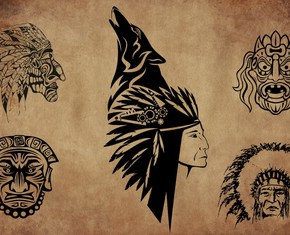The views expressed in our content reflect individual perspectives and do not represent the authoritative views of the Baha'i Faith.
Becoming a Baha’i means first answering this central question: Who was Baha’u’llah, the founder and prophet of the newest global Faith — and do I believe what he taught?
Since Baha’is follow Baha’u’llah’s teachings and regard him as the most recent divine messenger, any quest to understand the Baha’i Faith starts by answering that question.
Baha’u’llah, born in Tehran, Persia on November 12, 1817, was named Mirza Husayn Ali. The son of Mirza Abbas, who was also known as Mirza Buzurg, a notable landowner and government official from the province of Nur, Baha’u’llah descended from both Abraham and Zoroaster.
A precocious child, Baha’u’llah’s teachers in school told his father that he already knew what they tried to teach him. In his early adulthood, Baha’u’llah became known in Persia as “the father of the poor,” for his charitable work among the destitute and the homeless. A poet and a mystic, at the age of 27 Baha’u’llah joined the newly-established Babi Faith in 1844, and enthusiastically promulgated the revolutionary new religion of the Bab — who proclaimed that he had come to herald the way for “Him Whom God shall make manifest,” the Promised One of all ages.
Despite persecution from the Muslim clergy, and his arrest and torture for his beliefs, Baha’u’llah became a Babi leader. The followers of the Bab, whose Faith grew so rapidly that it threatened the power of the Muslim clerics and the government, were mercilessly persecuted, tortured, and executed. After the government’s execution of the Bab in 1850 and Baha’u’llah’s subsequent exile from Persia in 1852, he proclaimed the beginning of the Baha’i Faith in 1863 from Baghdad. Announcing the advent of his new Faith, Baha’u’llah wrote:
The Revelation which, from time immemorial, hath been acclaimed as the Purpose and Promise of all the Prophets of God, and the most cherished Desire of His Messengers, hath now, by virtue of the pervasive Will of the Almighty and at His irresistible bidding, been revealed unto men.
Baha’u’llah spent the rest of his life — 40 years — in prison and in repeated exiles to Constantinople (now Istanbul, Turkey), Adrianople (now Edirne, Turkey), and finally to the penal colony of Akka in Palestine, near Haifa, in what is now Israel. Despite his imprisonment, he proclaimed the Baha’i Faith’s principles of peace, universal love, and world unity, and his new Faith grew into a global religion. Who was he, this prisoner who has inspired such allegiance and love among so many millions of devoted followers from so many nations, races, and former Faiths?

Information about Baha’u’llah can be found in many places, but this brief description from Peter Smith’s “A Concise Encyclopedia of the Baha’i Faith” indicates how those who encountered him often reacted:
The great devotion and love that his followers felt for Baha’u’llah makes it difficult for us to gain an impression of what he was actually like. Thus their accounts of Baha’u’llah emphasize his overwhelming and ineffable presence, one writer stating that it was almost impossible for anyone to look into his eyes or utter a complete sentence in his presence.
Another, more detailed description came from the famed British Orientalist scholar E. G. Browne, the only Westerner who ever met Baha’u’llah, quoted here in Shoghi Effendi’s book “God Passes By”:
“The face of Him on Whom I gazed,” is the interviewer’s memorable testimony for posterity, “I can never forget, though I cannot describe it. Those piercing eyes seemed to read one’s very soul; power and authority sat on that ample brow …. No need to ask in whose presence I stood, as I bowed myself before one who is the object of a devotion and love which kings might envy and emperors sigh for in vain.” “Here,” the visitor himself has testified, “did I spend five most memorable days, during which I enjoyed unparalleled and unhoped-for opportunities of holding intercourse with those who are the fountain-heads of that mighty and wondrous spirit, which works with invisible but ever-increasing force for the transformation and quickening of a people who slumber in a sleep like unto death. It was, in truth, a strange and moving experience, but one whereof I despair of conveying any save the feeblest impression.”
Just as all the prophets and founders of the world’s great Faiths underwent persecution for their beliefs and teachings, Baha’u’llah suffered enormously as a result of proclaiming his new religion.
In a way that’s understandable, because his teachings upended the very basis of the backward societies where he lived. In fact, they still challenge humanity to change. Baha’u’llah taught world peace, racial and religious unity, the essential harmony of science and religion, the equality of men and women, and the elimination of the extremes of poverty and wealth. He advocated compulsory universal education, the adoption of a universal auxiliary language, and the formation of a global parliamentary system of governance. Like every great spiritual messenger, all of these teachings put Baha’u’llah at odds with the officials and clergy of his time, and they ultimately attracted millions of devoted followers the world over.
In this remarkable passage from E. G. Browne’s description of his meetings with Baha’u’llah, cited in J. E. Esslemont’s “Baha’u’llah and the New Era”, Browne recounted what Baha’u’llah said to him:
Praise be to God that thou hast attained!… Thou hast come to see a prisoner and an exile …. We desire but the good of the world and happiness of the nations; yet they deem us a stirrer up of strife and sedition worthy of bondage and banishment …. That all nations should become one in faith and all men as brothers; that the bonds of affection and unity between the sons of men should be strengthened; that diversity of religion should cease, and differences of race be annulled — what harm is there in this?… Yet so it shall be; these fruitless strifes, these ruinous wars shall pass away, and the “Most Great Peace” shall come …. Do not you in Europe need this also? Is not this that which Christ foretold?… Yet do we see your kings and rulers lavishing their treasures more freely on means for the destruction of the human race than on that which would conduce to the happiness of mankind …. These strifes and this bloodshed and discord must cease, and all men be as one kindred and one family …. Let not a man glory in this, that he loves his country; let him rather glory in this, that he loves his kind.
















Comments
Sign in or create an account
Continue with Googleor